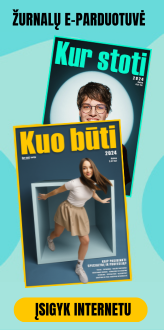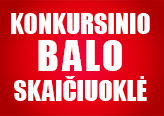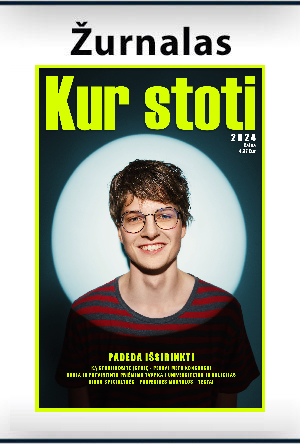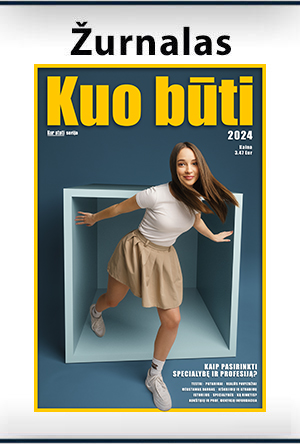If you’re reading this, you’re probably thinking about entering the English and Russian Languages study program at VU KHF. If I were you, I’d have a few questions I’d want to discuss before I made my decision. Like, what will I learn there that I don’t know already? Will graduating from this program help me get a job? Will studying here be just a lot of hard work, or will I have fun and make friends while I’m at it? And finally, why should I study in Kaunas instead of Vilnius?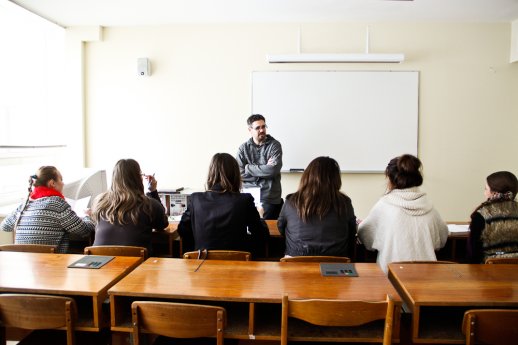
Well, let me see if I can answer any of those questions. (Before I begin, I should mention that I teach English, not Russian, so English is mostly what I’m going to talk about here. But I think a lot of what I have to say applies to both languages.)
What will you learn that you don’t know already? In a word, lots! In school you learn the practical side of English, what teachers call the four skills—reading, listening, writing, and speaking. You also learn grammar and vocabulary. Of course, you’re going to keep studying all those things here, too. But we also show you the “other side” of English, the technical side. In courses like Phonology, Syntax, Psycholinguistics, and Cognitive Linguistics, you’ll step behind the scenes to find out how and why English works the way it does. You’ll see that language is a complex psychological and social event, and learn that many common words and concepts actually stem from primal, universal experiences that shed light on what it means to be human.
Will an English and Russian Languages BA help you find a job? Certainly! Now, I won’t lie to you—so would just about any other BA, as well. Employers want you to have a BA like they want you to have a pulse: it’s just a requirement now. When it comes down to getting a job, an employer is going to care less about the name of your study program than who you are, how you present yourself, and what you can do for the company. 90% of successful interviewing is how you talk about those things. Can a study program that teaches you how to use not one, but two languages hurt your chances at acing an interview? I don’t think so.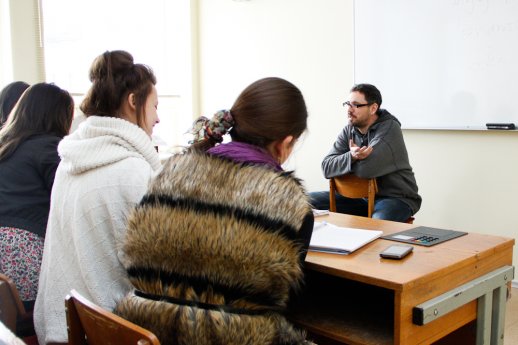
What about the study program itself—what’s that like? Well, it’s only natural that studying two languages at the same time can be a challenge. But nothing that’s worth doing is easy! (It would be a lot easier for you to lie around in bed all day watching YouTube videos than to try to decide which study program to choose, but you’re here, reading this now, because you know that only through hard work do you end up getting what you want. Right?) I’ve been teaching in the English and Russian languages program for nine years now, and I often keep in touch with students after they graduate. I can say for sure that the friends you make in this program will be with you forever. You’ll work hard together, yes—but you’ll also relax together, and celebrate holidays together, and get through exams together, and graduate together.
Last but not least, why study in Kaunas? I don’t know! (How’s that for an honest answer?) Obviously, if you prefer Vilnius, go there—some people like it better. As for me, I’ve been a fan of Kaunas since the first time I came here. I love living in a university town. It feels young and energetic, optimistic and willing to change. And VU KHF is in the Old Town, where the number of cafes and bars and unique restaurants just keeps growing. When the weather’s good, you can’t ride a bike down Vilniaus Street—there are too many people walking, talking, drinking, smoking, playing street music, taking pictures, and just being interesting. It’s something to see, and I’m proud to be a part of it. I’d love it if you joined us!
Dvi kalbos – viena specialybė
Jeigu tu tai skaitai, greičiausiai galvoji apie galimybę stoti į Anglų ir rusų kalbų programą VU KHF. Tavo vietoje, prieš apsispręsdamas, norėčiau gauti atsakymus į kelis klausimus. Pavyzdžiui, ko aš ten išmoksiu ko dar nemoku? Ar baigus šią programą gausiu darbą? Ar studijos čia bus vien tik sunkus darbas, ar linksmybės ir nauji draugai? Ir galiausiai, kodėl turėčiau studijuoti Kaune, o ne Vilniuje?
Pažiūrėkim, ką aš galiu atsakyti į šiuos klausimus. Prieš pradėdamas, noriu paminėti, kad dėstau anglų, ne rusų kalbą, taigi ir kalbėsiu daugiausiai apie ją. Bet, manau, dauguma dalykų tinka abejoms kalboms.
Ko išmoksi ko dar nežinai? Vienu žodžiu tariant – daug! Mokykloje išmokai praktinę anglų kalbos pusę, tai, ką mokytojai vadina keturiais gebėjimais – skaitymas, klausymas, rašymas ir kalbėjimas. Taip pat mokeisi gramatikos ir leksikos. Žinoma, čia ir toliau mokysies to paties. Bet mes parodysime ir „kitą anglų kalbos pusę“ – techninę. Mokydamasis tokius dalykus kaip fonologija, sintaksė, psicholingvistika ir kognityvinė lingvistika, žengsi į užkulisius, kad suprastum, kodėl anglų kalba veikia taip, kaip veikia. Suprasi, kad kalba yra psichologijos ir socialinių įvykių mišinys, išmoksi, kad daug bendrų žodžių ir koncepcijų iš tikrųjų yra kilę iš pirmykščių ir universalių patyrimų, kurie parodo, ką reiškia būti žmogumi.
Ar anglų ir rusų kalbų diplomas padės susirasti darbą? Žinoma! Nemeluosiu, darbą galėsi susirasti ir su bet kuriuo kitu bakalauro diplomu. Darbdaviams tavo diplomas reikalingas lygiai tiek, kiek tau reikalingas pulsas: tiesiog toks reikalavimas. Prieš priimant į darbą, darbdaviui kur kas labiau rūpės tai, kas tu esi, kaip sugebi save pristatyti, ir tai, ką gali padaryti dėl įmonės, o ne tai, kaip vadinasi tavo studijų programa. Devyniasdešimt procentų sėkmės interviu metu sudaro tai, kaip tu kalbi apie tuos dalykus. Ar studijų programa, kuri tave moko naudotis ne viena, o dviem kalbomis, gali pabloginti tavo galimybes interviu metu? Nemanau.
Na, o kaip pati programa – kaip čia viskas? Natūralu, kad studijuoti dvi kalbas vienu metu gali būti tikras iššūkis. Bet juk niekas, ką yra verta daryti, nėra lengva. Kur kas lengviau būtų visą dieną vartytis lovoje žiūrint Youtube‘ą negu bandant apsispręsti, ką studijuoti, tačiau dabar tu esi čia, skaitai šį straipsnį, nes suvoki, kad tik sunkiai dirbdamas pasieksi tai, ko nori. Tiesa? Šiose studijose aš dirbu jau devynerius metus ir palaikau ryšį su jau baigusiais studentais. Galiu drąsiai teigti – čia sutikti draugai išliks visą gyvenimą. Kartu sunkiai dirbsit, bet kartu ir atsipalaiduosit, kartu švęsit šventes, kartu laikysit egzaminus ir kartu baigsit universitetą.
Paskutinis, bet ne paprasčiausias klausimas – kodėl studijuoti Kaune? Nežinau! (Kaip tau toks sąžiningas atsakymas?) Žinoma, jei tau labiau patinka Vilnius – važiuok ten. O man Kaunas patiko iš pat pirmo karto, kai tik čia atvykau. Man patinka gyventi universitetų mieste. Ore tvyro jaunatvė ir energija, optimizmas ir noras keistis. VU KHF įsikūręs senamiestyje, kur apstu kavinių, barų ir unikalių restoranų. Geru oru net neįmanoma minti dviračio pedalų Vilniaus gatve: čia daug žmonių vaikšto, kalbasi, gurkšnoja, rūko, groja, fotografuoja ir tiesiog domisi. Tai verta pamatyti, ir aš didžiuojuosi būdamas to dalimi. Ir aš tikrai džiaugsiuos, jeigu tu prie mūsų prisijungsi.
Vertė Justas Vaičiulis
